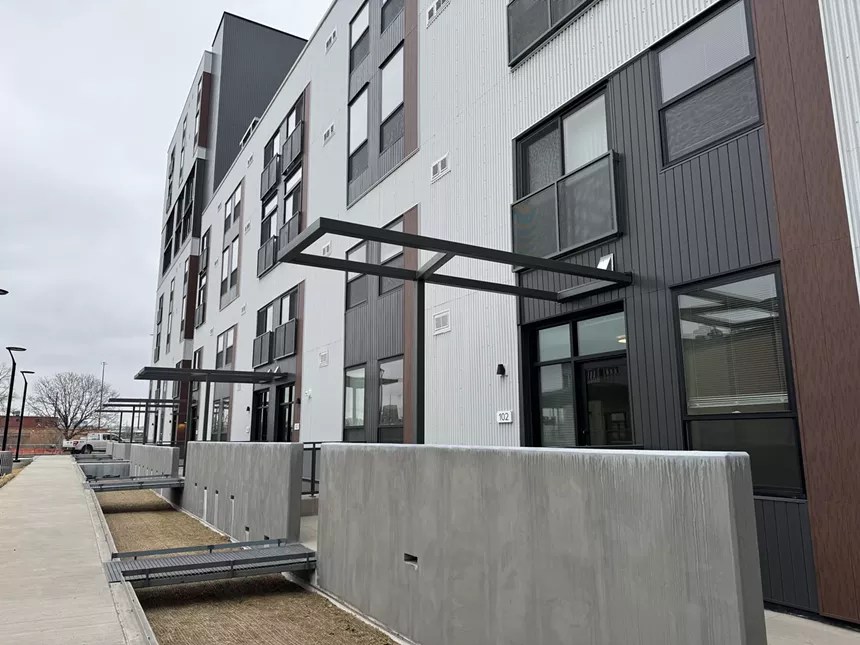
Catie Cheshire

Audio By Carbonatix
As Denver shapes the 2025 Vibrant Denver General Obligation (GO) Bond, we must ask: What does a truly vibrant city look like? Traditionally, GO bonds have funded infrastructure like parks, cultural spaces and roads. But with family homelessness in Colorado rising 34 percent from 2023 to 2024, leaving 4,878 families without stable housing, and 61 percent of likely voters having moved or considered a move due to financial strain, there is no infrastructure need more urgent than safe, permanently affordable and community-controlled housing.
Corporate landlords prioritize profits over people, neglecting maintenance and dodging accountability, driving Colorado families out of their homes. For example, Greystar left Welton Park residents without water for nearly a week after a pipe burst and CBZ management failed to provide heat, hot water, natural gas or a working fire alarm system at the William Penn Apartments.
This crisis stems from government policies that slashed public funding for affordable housing, and relied on for-profit investors to develop affordable housing through programs like the Low Income Housing Tax Credit (LIHTC). Denver primarily funds affordable housing via these tax breaks for private sector developers, meaning homes are only produced when profitable and eventually revert to market rates. Treating housing as a commodity rather than a basic need has failed to keep families housed.
Denver residents know this isn’t working. While 73 percent of Coloradans believe their local government should be doing more to address affordable housing, an equal percentage find current policies ineffective. The 2025 GO bond is a critical opportunity to change course by prioritizing public investment in permanently affordable and community-controlled housing over profit-driven development. Studies show that “social,” “decommodified” or “municipally-owned” housing is effective at keeping people housed, and even keeps residents healthier than those renting in the private market.
These solutions already exist in Denver and need greater investment:
1) Community Land Trusts: CLTs are nonprofit organizations that acquire land to ensure permanent affordability by separating land ownership from housing, thus preventing speculation and displacement. Just last December, Tierra Colectiva, the Globeville-Elyria Swansea Community Land Trust and the East Colfax Community Collective’s Mixed Income Neighborhood Trust (MINT) presented affordable housing solutions to Denver City Council. Tierra Colectiva estimated a $35 million investment in the CLT could create 600 units, while MINT highlighted the successful $3 million preservation of a 23-unit apartment.
2) Social Housing: Publicly owned, mixed-income housing ensures long-term affordability by reinvesting rent revenue into the system. Modeled after Montgomery County, Maryland’s $50 million social housing bond, Denver could use GO bond funds to acquire and develop permanently affordable homes, leveraging existing city-owned properties for public benefit. The Montgomery County Housing Production Fund proves that publicly owned housing can be self-sustaining by using tiered rents to cover costs, reducing reliance on federal funding.
3) Limited Equity Cooperatives: LECs provide shared ownership, keeping housing costs low and preventing displacement. Denver has successful examples:
â— The Queen City Cooperative and Boulder Housing Cooperative have created permanently affordable rental units
â— Westwood residents collectively purchased their mobile home park for $11.5 million in 2024, with a $2.6 million city loan, facilitated by the Justice for the People Legal Center.
Together, these models can create the affordable housing Denver needs – housing that is insulated from corporate landlords, permanently affordable and community-controlled. With greater public investment, CLTs, social housing and cooperatives could scale to provide long-term stability for thousands of residents.
Critics may argue that the government shouldn’t be in the business of housing, or that public programs are inefficient. But the government already shapes the housing market – just in ways that benefit private developers more than Denver residents. Billions in tax subsidies, zoning decisions and financing structures dictate what gets built and for whom. Instead of continuing to subsidize profit-driven strategies that have failed to provide affordable housing, we should invest in housing that serves Denver’s residents. Successful models across the country – and right here in Denver – prove that social housing is stable and can keep people housed for the long term. This isn’t about feasibility; it’s about political will.
Decisions about the GO bond are happening now, and Denver residents must demand investment in the infrastructure that truly matters – affordable housing. Here’s how you can help:
â— Attend Denver City Council town halls in your district and the April 8 at-large town hall
â— Respond to the public survey before the April 17 deadline
â— Contact Denver City Council members and the Mayor’s Office
Stable housing is more than just a roof over our heads – it is the foundation for health, education, economic mobility and the pathway to Vibrant Denver for our families, children, neighbors and newcomers. By investing in housing as essential infrastructure in the 2025 Vibrant Denver GO bond, we can build a thriving, resilient city where everyone has a dignified, stable place to call home.
My-Linh Nguyen Luong is a civic-minded public health advocate in Denver; Shannon Hoffman is an educator, community organizer, housing justice advocate and proud socialist. They both serve on the Budget Work Group for the Transforming Our Communities Alliance, a Denver-based organization dedicated to developing community-led solutions to public safety and community well-being.
On weekends, Westword.com publishes commentaries on matters of interest to the community; the opinions are those of the authors, not Westword. Have one you’d like to submit? Send it to editorial@westword.com, where you can also comment on this piece.